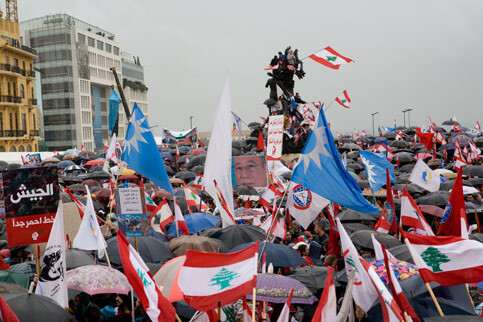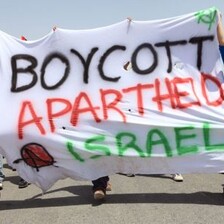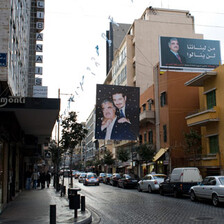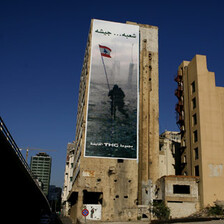Electronic Lebanon 14 February 2008

Lebanese supporters of the March 14 coalition attend a demonstration in Beirut on the third anniversary of former Prime Minister Rafiq Hariri’s assassination, 14 February 2008. (Matthew Cassel)
I cannot remember a time, especially in the last three years, when the collective that comprises Lebanese social life was not anticipating some form of political violence, elevated at times to an outright expectation of civil war. One thing we must keep in mind with all this talk of war in Lebanon is that, in recent years, most people here seem to have developed a more nuanced and complex view of the fine line between war and peace; since Prime Minister Rafiq Hariri’s assassination in 2005, I have heard people say that Lebanon was living an illusion of peace but that it had never escaped the state of war. Traversing through different parts of Lebanon the conversation is the same: will war break out? When? Who will start it? Who will fight? But in our nuanced understanding it is not unlikely to find agreement amongst people that the war already began or indeed, never ended. However, as with most things in life, there is a lag between how we come to understand things and how we begin to speak of them. So for now, we continue to speak about a future state of war that is in contrast to our present state of non-war.
Up until now many people conclude that while the situation might deteriorate, it seems more likely that there will only be smaller, more frequent outbreaks of violence rather than an all-out war (if these two situations are in fact any different then one should begin to wonder if war is a feeling or an actual observable and definable state). In any case, whether this forecast will prove true does not really matter. What is important is that it is a forecast based on little in the form of observed fact and therefore, it is just as plausible for people to predict a bloody civil war. What this forecast tells us is that people in Lebanon are generally trying to stay optimistic, but also trying to live in denial. This denial partly comes from a perception that they could not change the course of events if they were to confront and accept the inevitability of war, while the optimism is to ensure an ability to get on with life.
The very idea of getting on with life, of living, has become politicized in this country. It has taken on a connotation of resistance and is used to deny the political ambitions of the political party one opposes. When the opposition takes to the streets we say “We want to live” (Bidna en’eesh) and call for business as usual; when the pro-government March 14 factions take to the streets we do and say the same to deny the opposition’s politics. Ironically, we politicize the very fact of getting on with life in order to depoliticize ourselves, claiming “We don’t want politics” (Ma bidna siyasseh or bala siyasseh), “We have become disgusted with politics” (Irifna al-siyasseh), or resorting to some other comment to show our want to detach from politics. Once the Lebanese really start to think of this seriously, we will realize that de-politicization is an impossibility, and refusing to take sides by cursing all sides is a disingenuous move if it is not accompanied by an alternative political movement.
This is where Lebanese denial and optimism of life becomes dangerous. It allows us to continue with our lives and make forecasts that allow us to accept the reality of our everyday, thus not feeling the need to mobilize against our politicians or form creative and alternative politics. In large part this is due to the disunity and disorganization of the people. While there are exceptions, like activists forming coalitions and starting campaigns, or non-governmental organizations coming together to find solutions, the majority sits by idly, hoping their forecasts will save their lives. The others who do get involved show us that the power and politics of the people is not always progressive or moral.
My own assessment of the situation is that so long as we consider Lebanese politics to be divided among the March 14 and opposition coalitions we will not go to large scale war. Let me break things down as I see them:
1. The March 14 factions are too divided ideologically to fight under one banner or to take up arms and fight side by side for the power they seek. Unlike the Lebanese National Movement (LNM) of the 1970s, there is no clear ideology that binds the March 14 movement in its struggle for power with Hizballah. Though weapons are never a problem and can be acquired in the first moments of war, the individual parties generally lack the military training and preparation of Hizballah, and it is unlikely that they could agree amongst each other on how to run the war. Unlike 1975, when the LNM was held together more or less by a leftist idea, a strong political leader such as Kamal Junblatt and even Gamal Abdel Nasser, and were calling for reforms and had a clear plan, the March 14 movement is loosely connected and much less bounded. I believe this is the more likely reason they will avoid the breakdown of diplomacy, and not because of some notion that people like March 14 leader Sa’ad Hariri have too much financially invested, and too much at stake, to see the country plunge into war and watch all the reconstruction fall apart. If Hariri is guaranteed funds and aid to rebuild, or if he calculates that a war will reap more benefits in the long run then the march to war is a simple leap. Actually, it is precisely the underlying and overlaying sectarian tensions of the March 14 movement that will prevent it from marching willingly to war as a means to an end.
2. On the part of the opposition parties we can perhaps see a more likely ability for the parties to fight under one banner, having signed a pact with clear points of unity. The military mindset that drives General Michel Aoun, the leader of the Free Patriotic Movement, is shared by Sayed Hassan Nasrallah, the Secretary General of Hizballah, and there is potential to unite them against American malevolent interference, especially as I have seen the rhetoric against American involvement rise among some Aoun supporters. However, what stops the opposition parties from any interest in going to war, and what makes them demand a cessation of violence at the end of every night of clashes thus far, is that in internal conflict Hizballah clearly stands to lose its power and position in Lebanon and vis-a-vis Israel. For Hizballah, a war serves Israel’s cause, and if it is dragged into one it would be knowingly serving that cause. In essence, key leaders in both coalitions recognize that a war would not strengthen their position and will try their best not to use this means of politics.
3. We are left with the ever-present specter of the fifth column, that force, or coalition, that has been the bane of Lebanese politics and social life, that phenomenon to which all violence in Lebanon has historically been attributed. This fifth column has been around for so long one would wonder if they have an office in the country where one could go and register for service with the column. When the notion of the fifth column is raised in conversation there is no longer debate between Lebanese; we are able to reach agreement almost instantly by blaming it on the ghost we can never hold accountable. But in the same way, it allows us to return to our state of denial, for if we do not know who is pushing us to war and who is starting it then we cannot solve our problems on our own and we might as well just live our lives.
So tonight after the day of protest in Martyr’s Square, come to Gemeyzeh, where you can have a drink, and find many Lebanese living but in denial. In the meantime, in more than one corner of the country, tensions are brewing and the country teeters over the abyss of political chaos. Calling it war or clashes or conflict or chaos is mere semantics for the people who have already begun to fall victim to internal bickering while Israel watches, laughing patiently, as we turn the victory that the Winograd Commission confirmed for us into a bloody defeat.
Sami Hermez is a doctoral student of anthropology at Princeton University researching violence and armed resistance in Lebanon and has been active in relief and redevelopment projects in the south of Lebanon. Sami can be reached at shermez at princeton.edu.





